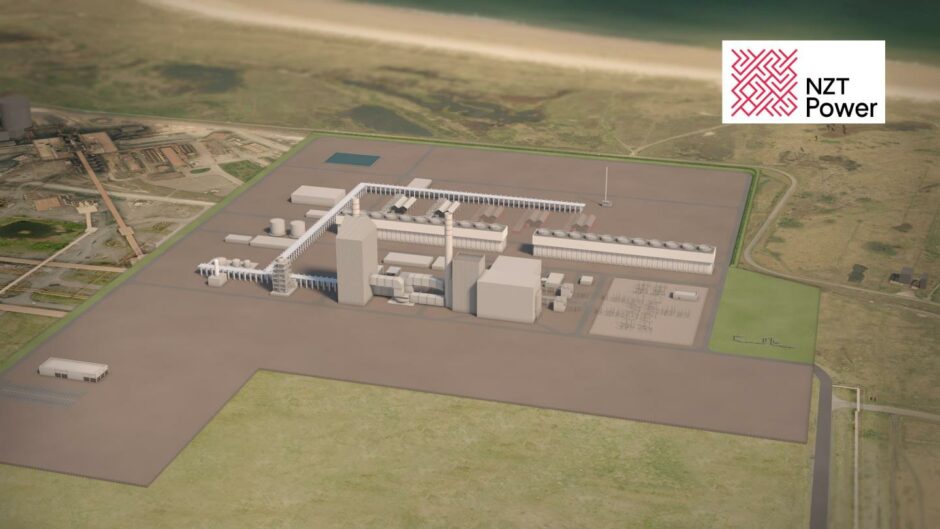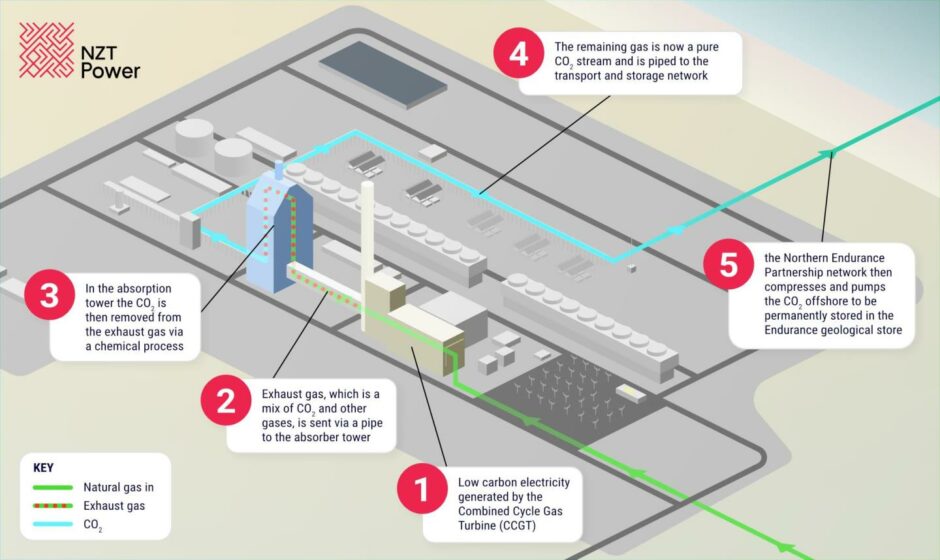
Two groups of engineers have been selected by BP to provide competing concepts as part of the UK’s first full-scale integrated power and carbon capture project in Teesside.
BP has issued the first front-end engineering and design (FEED) contracts covering the Net Zero Teesside Power (NZT Power) project and the Northern Endurance Partnership’s carbon compression infrastructure.
With up to 860 MW of capacity, NZT Power is the world’s first commercial scale gas-fired power station with carbon capture, and is being developed as a joint venture between BP and Equinor, with BP leading as operator.
It will share CO2 transport and storage infrastructure with the Northern Endurance Partnership (NEP) – a group comprised of BP, Eni, Equinor, National Grid, Shell and TotalEnergies – which will gather and compress CO2 from NZT Power and other regional sources and export it offshore sub-surface storage in the Endurance carbon store.
The infrastructure forms a major component of the East Coast Cluster scheme to decarbonise industrial emissions around the Humber and Teesside.
One FEED consortium is led by Technip Energies alongside General Electric, with Shell as a subcontractor for the provision of the licensed Cansolv CO2 capture technology and Balfour Beatty as the nominated construction partner.
Another is led by Aker Solutions, alongside Doosan Babcock and Siemens Energy, with Aker Carbon Capture as a subcontractor for the provision of licensed CO2 capture technology.
The two groups will now design and submit development plans for the proposed power station and carbon capture plant, and NEP’s compression and export facilities.
Each will each deliver a comprehensive FEED package, led from their UK offices, over the next 12 months.
Following the completion of the FEED process, the two consortia will then submit engineering, procurement and construction (EPC) proposals for the execution phase.
As part of the final investment decision (FID) expected in 2023, a single group will then be selected to take the project forward into construction, BP confirmed.
BP senior vice president for projects Ewan Drummond said: “The signing of the dual FEED contracts today is the culmination of an extensive market engagement process over the past 18 months and we are excited to be working with the selected Aker and Technip UK-led consortiums.
“Our contracting strategy enables early selection of carbon capture licensors and power providers along with EPC and construction contractors to minimise the technology and execution risks whilst allowing each consortium to differentiate themselves in their designs and execution approaches.”
In October, the East Coast Cluster secured a share of a £1billion government ‘Track 1’ investment pot to get carbon capture and storage hubs up and running by the mid-2020s, alongside rival project HyNet.
Developers of the Cluster say the project has the potential to transport and securely store nearly 50% of all UK industrial cluster CO2 emissions – up to 27 million tonnes of CO2 emissions a year by 2030.
It is aimed at supporting 25,000 jobs per year between 2023 and 2050, with approximately 41,000 jobs at the project’s peak in 2026.
NEP managing director, Andy Lane, added that the signing of the FEED contracts was “a clear signal of momentum within the East Coast Cluster” following its selection for funding by government.
Arnaud Pieton, CEO of Technip Energies said the group was “honoured” to have been selected.
“Our capabilities in carbon capture projects and technology integration, combined with GE Gas Power’s expertise in natural gas combined cycle plant engineering, operability, and plant integration, will support BP’s goal of developing one of the first decarbonised industrial clusters in the world.
“This project perfectly illustrates that cross-industries collaboration is central to reaching net-zero targets,” he continued.
Aker Solutions’ CEO Kjetel Digre commented: “Net Zero Teesside is a landmark development for the UK and an important step on the journey to net zero. Our consortium of Aker Solutions, Siemens Energy and Doosan Babcock is exceptionally proud to be working together with BP on this ground-breaking project to support the energy transition.”
BP said that NZT Power expects to submit a bid in January 2022 for selection as part of phase 2 of the UK government’s CCUS cluster sequencing process.
The FEED awards follow the energy major’s announcement in November that it will construct a large-scale green hydrogen production facility in Teesside as part of its development plans.
To be developed in multiple stages, HyGreen Teesside is expected to begin production by 2025, with an initial phase of some 60MW of installed hydrogen production capacity. This could eventually scale up to 500MW of hydrogen production by 2030.
Recommended for you

 © Supplied by BP
© Supplied by BP